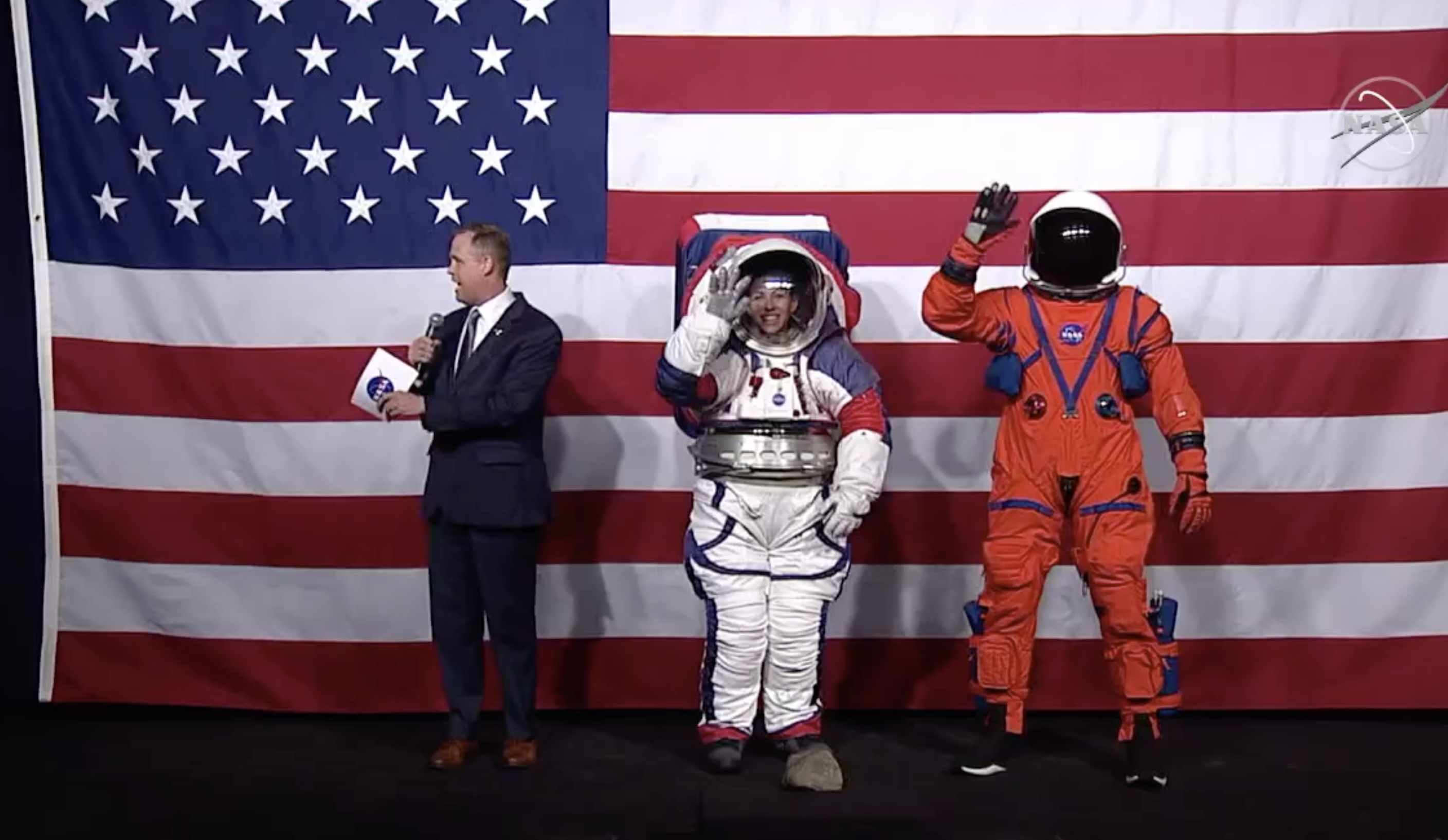NASA unveils spacesuits to be worn by first woman, next man to land on the moon


A free daily email with the biggest news stories of the day – and the best features from TheWeek.com
You are now subscribed
Your newsletter sign-up was successful
It's fashion week for NASA.
Tuesday afternoon, the space agency revealed two new spacesuits to be worn by astronauts during Artemis missions, with the goal of landing the first woman and next man on the moon by 2024.
The full suit, named xEMU, is designed for use on the surface of the moon, and features red, white, and blue elements. The main goal for the design was to increase mobility and flexibility, enabling astronauts to move and pick up objects, like lunar rocks, with ease, reports TechCrunch. This marks a major improvement from the suits worn in the Apollo mission, which required astronauts to "bunny-hop".
The Week
Escape your echo chamber. Get the facts behind the news, plus analysis from multiple perspectives.

Sign up for The Week's Free Newsletters
From our morning news briefing to a weekly Good News Newsletter, get the best of The Week delivered directly to your inbox.
From our morning news briefing to a weekly Good News Newsletter, get the best of The Week delivered directly to your inbox.
The suit can also withstand temperatures ranging from -250 to 250 degrees Fahrenheit, per NASA. It features interchangable parts, allowing the suit to be worn on the International Space Station, in lunar orbit, on the moon, or on Mars, and can be upgraded to "keep crew warm in the Mars winter and prevent over heating in the summer," according to NASA.
The second suit is bright orange and meant to be worn during take-off and landing, and is dubbed the "Orion Crew Survival Suit."
The new suits feature inclusive sizing, per TechCrunch. This comes after the first all-women spacewalk was canceled earlier this year for lack of a proper-sized suit. Kristine Davis, an advanced space suit engineer at NASA, said they will fit men and women of all sizes.
"We want every person who dreams of going into space to be able to say to themselves, that yes, they have that opportunity," said NASA Administrator Jim Bridenstine during the unveiling. Read more at TechCrunch.
A free daily email with the biggest news stories of the day – and the best features from TheWeek.com
Taylor Watson is audience engagement editor for TheWeek.com and a former editorial assistant. She graduated from Syracuse University, with a major in magazine journalism and minors in food studies and nutrition. Taylor has previously written for Runner's World, Vice, and more.
-
 Political cartoons for February 15
Political cartoons for February 15Cartoons Sunday's political cartoons include political ventriloquism, Europe in the middle, and more
-
 The broken water companies failing England and Wales
The broken water companies failing England and WalesExplainer With rising bills, deteriorating river health and a lack of investment, regulators face an uphill battle to stabilise the industry
-
 A thrilling foodie city in northern Japan
A thrilling foodie city in northern JapanThe Week Recommends The food scene here is ‘unspoilt’ and ‘fun’
-
 Blue Origin launches Mars probes in NASA debut
Blue Origin launches Mars probes in NASA debutSpeed Read The New Glenn rocket is carrying small twin spacecraft toward Mars as part of NASA’s Escapade mission
-
 Dinosaurs were thriving before asteroid, study finds
Dinosaurs were thriving before asteroid, study findsSpeed Read The dinosaurs would not have gone extinct if not for the asteroid
-
 SpaceX breaks Starship losing streak in 10th test
SpaceX breaks Starship losing streak in 10th testspeed read The Starship rocket's test flight was largely successful, deploying eight dummy satellites during its hour in space
-
 Rabbits with 'horns' sighted across Colorado
Rabbits with 'horns' sighted across Coloradospeed read These creatures are infected with the 'mostly harmless' Shope papilloma virus
-
 Lithium shows promise in Alzheimer's study
Lithium shows promise in Alzheimer's studySpeed Read Potential new treatments could use small amounts of the common metal
-
 Scientists discover cause of massive sea star die-off
Scientists discover cause of massive sea star die-offSpeed Read A bacteria related to cholera has been found responsible for the deaths of more than 5 billion sea stars
-
 'Thriving' ecosystem found 30,000 feet undersea
'Thriving' ecosystem found 30,000 feet underseaSpeed Read Researchers discovered communities of creatures living in frigid, pitch-black waters under high pressure
-
 New York plans first nuclear plant in 36 years
New York plans first nuclear plant in 36 yearsSpeed Read The plant, to be constructed somewhere in upstate New York, will produce enough energy to power a million homes
